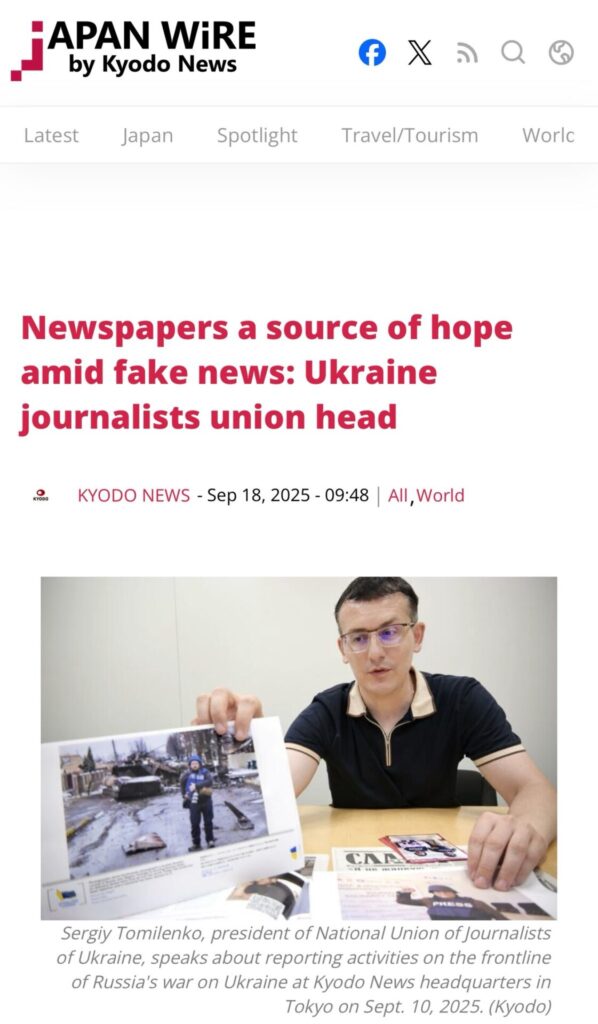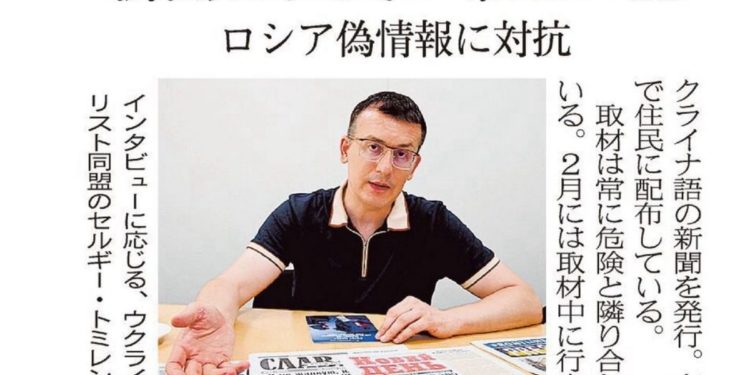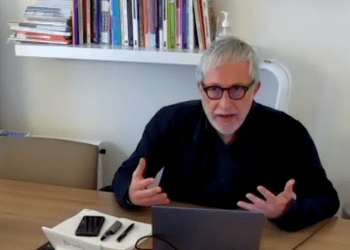Frontline newspapers as a source of hope. Ukrainian journalism is in the spotlight of a leading Japanese agency. Kyodo News is one of the most influential media outlets in Japan, supplying news to hundreds of publications across the country and the world. It published an interview with Sergiy Tomilenko, the President of the National Union of Journalists of Ukraine (NUJU). The agency focused on the unique role of frontline newspapers and the courage of Ukrainian media workers.
During the full-scale war, NUJU supported the publication of about 30 newspapers in frontline regions. When russian strikes destroy printing houses and cut off the Internet, these publications become the only source of verified information for civilians.
“This is very important for Ukrainians, because they get their own media – media they trust, media with a history,” Sergiy Tomilenko, who led the NUJU delegation to Japan, explained to Kyodo News.
In the Kherson and the Kharkiv, Sumy, and Donetsk Regions, editors have created their own delivery system – employees personally hand out newspapers to residents when the post office is closed due to shelling.
“I proudly told the Japanese the stories of devoted editors of frontline newspapers – Anatolii Zhupyna (Novyi Den, Kherson), Svitlana Karpenko (Trudova Slava, Orikhiv), Oleksandr Pasichnyk (Zoria, Lyman), Kostiantyn Hryhorenko (Obrii Iziumshchyny, Kharkiv Region)…,” Sergiy Tomilenko wrote on Facebook.
The scale of russian repressions against Ukrainian media workers was especially striking to Japanese colleagues. More than 25 Ukrainian journalists are still in russian captivity. “Russia ignores any international conventions,” Sergiy Tomilenko emphasized in the interview. When Ukrainian journalists are captured in the occupied territories, it is impossible to contact them, even through lawyers.
Japanese journalists were also interested in the topic of preserving democratic institutions during wartime. As an example, we discussed the situation with anti-corruption bodies in the summer of 2025, when public protests forced the parliament to restore their independence. “We want to be part of the democratic world,” Sergiy Tomilenko explained.
The fact that a leading Japanese agency, which shapes the information agenda for millions of people in Asia, has devoted such attention to the work of Ukrainian journalists testifies to international recognition of the courage and professionalism of Ukrainian media workers. This is especially important for supporting our colleagues who continue to work in the most difficult conditions.
The publication in Kyodo News was part of a larger NUJU information campaign on the situation in Ukraine, which covered dozens of Japanese media outlets – from regional newspapers to national TV channels. This demonstrates the significant interest in Ukraine’s fate and the appreciation for the courage of Ukrainian journalists within Japanese society.

Reference Information:
The visit of the NUJU delegation to Japan generated significant media coverage in Japan. More than forty publications appeared in a wide variety of outlets, ranging from the leading national agency Kyodo News and the public broadcaster NHK to regional newspapers in remote prefectures.
The centerpiece of the campaign was a major interview with the President of the NUJU, conducted by the Kyodo News agency. Metropolitan publications, including the Tokyo Shimbun and popular online platforms such as Yahoo News Japan, quickly picked up the material.
The topic of Ukrainian journalism reached all major regions of the Japanese archipelago, from northern Tohoku, with its Fukushima Minyu, to the southern island of Kyushu, featuring local newspapers such as Kumanichi Shimbun. Even remote Okinawa, through its Okinawa Times, told readers about Ukraine’s frontline newspapers.
Thematically, Japanese journalists were most impressed by two things: first, the very idea of frontline newspapers as “sources of hope” for the civilian population, and second, the scale of repression against Ukrainian media workers by russia. Almost every publication mentioned the 25 captured Ukrainian journalists and the support of the NUJU by thirty publications in the frontline regions.
Such attention from Japanese media to Ukrainian journalism is unprecedented. And because of this great concern, we continue to count on international solidarity with Ukraine, with us.
Journalists are important!
NUJU Information Service

 THE NATIONAL UNION OF
JOURNALISTS OF UKRAINE
THE NATIONAL UNION OF
JOURNALISTS OF UKRAINE
















Discussion about this post